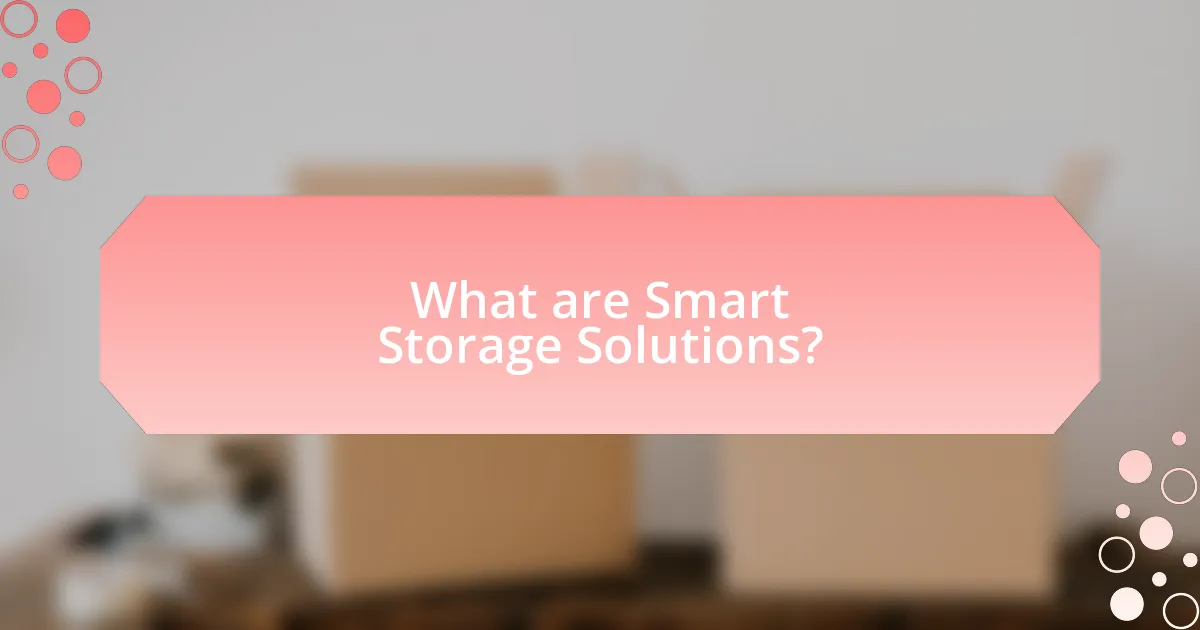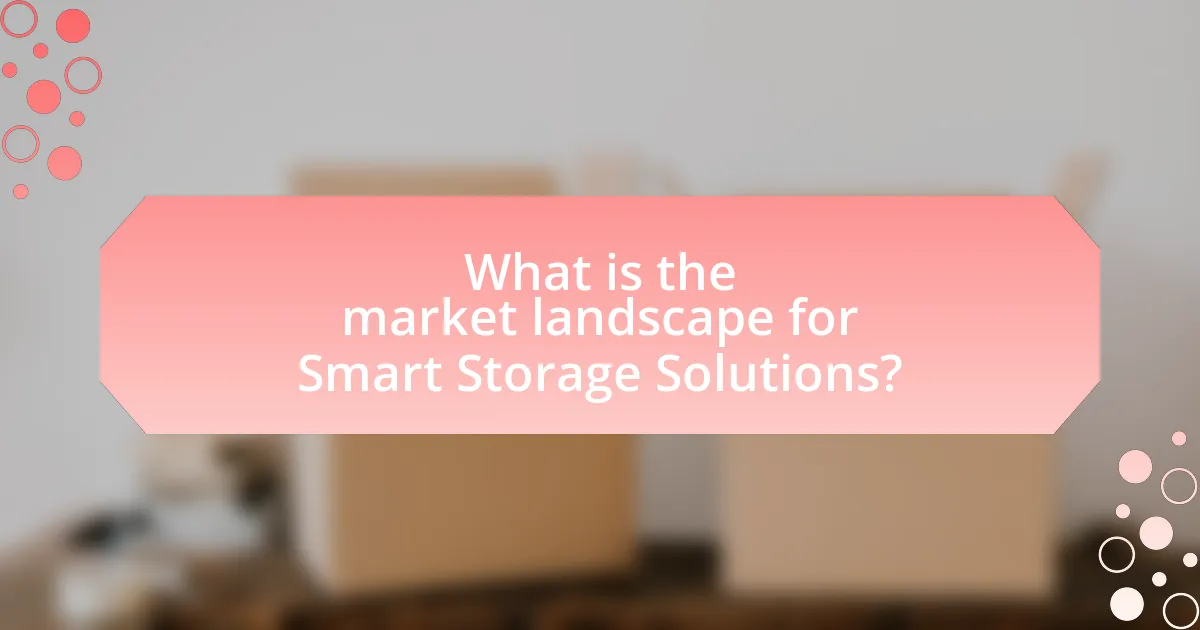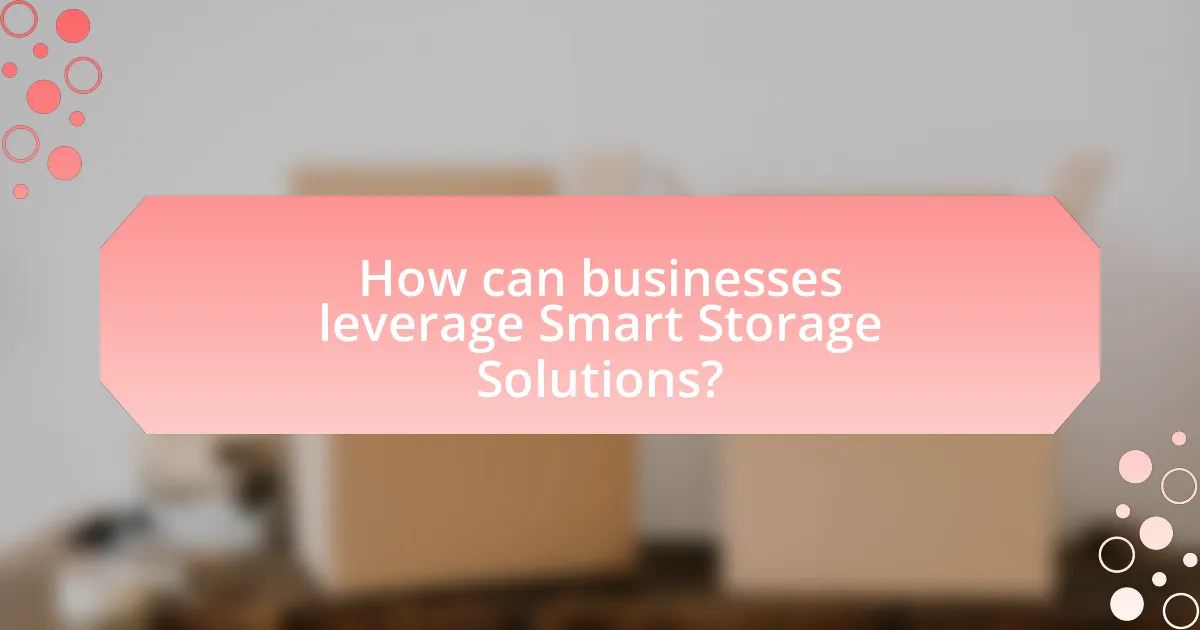Smart storage solutions represent advanced systems that enhance the organization, management, and retrieval of data or physical items through technologies such as cloud computing, automation, and artificial intelligence. This article explores the differences between smart storage and traditional options, highlighting the integration of IoT, AI, and data analytics that improve efficiency and accessibility. Key features, current trends, and the market landscape are examined, along with the challenges and future outlook for smart storage solutions. Additionally, the article discusses how businesses can leverage these technologies for operational efficiency and cost savings, while also addressing best practices for implementation and potential ROI.
What are Smart Storage Solutions?

 |
|
Smart storage solutions are advanced systems designed to optimize the organization, management, and retrieval of data or physical items. These solutions often incorporate technology such as cloud computing, automation, and artificial intelligence to enhance efficiency and accessibility. For instance, smart storage systems can automatically categorize and store items based on usage patterns, significantly reducing the time required for inventory management. The global smart storage market is projected to grow, driven by increasing data generation and the need for efficient storage solutions in various sectors, including retail and logistics.
How do Smart Storage Solutions differ from traditional storage options?
Smart Storage Solutions differ from traditional storage options primarily through their integration of technology, enabling enhanced efficiency, accessibility, and data management. Unlike traditional storage, which often relies on physical space and manual organization, smart storage utilizes sensors, automation, and cloud connectivity to optimize space usage and streamline inventory management. For instance, smart storage systems can automatically track inventory levels and provide real-time data analytics, which traditional methods cannot offer. This technological advancement leads to reduced operational costs and improved decision-making capabilities, as evidenced by a study from the International Data Corporation, which found that businesses implementing smart storage solutions experienced a 30% increase in operational efficiency.
What technologies are integrated into Smart Storage Solutions?
Smart Storage Solutions integrate technologies such as IoT (Internet of Things), AI (Artificial Intelligence), cloud computing, and advanced data analytics. These technologies enable real-time monitoring, automated inventory management, and predictive analytics for optimizing storage efficiency. For instance, IoT devices facilitate seamless communication between storage units and management systems, while AI algorithms analyze usage patterns to enhance decision-making processes. Cloud computing supports remote access and data storage, allowing for scalable solutions that adapt to changing business needs.
How do these technologies enhance storage efficiency?
These technologies enhance storage efficiency by optimizing data management and reducing physical space requirements. For instance, advanced compression algorithms can decrease the size of stored data, allowing more information to fit within the same storage capacity. Additionally, cloud storage solutions enable dynamic scaling, which adjusts resources based on demand, minimizing wasted space. According to a study by IDC, organizations that implement these technologies can achieve up to 30% more efficient storage utilization compared to traditional methods.
What are the key features of Smart Storage Solutions?
Smart Storage Solutions are characterized by their ability to optimize space, enhance accessibility, and improve data management. These solutions utilize advanced technologies such as cloud computing, IoT integration, and AI algorithms to facilitate real-time monitoring and control of storage systems. For instance, cloud-based storage allows users to access data from anywhere, while IoT devices can track inventory levels and automate reordering processes. Additionally, AI-driven analytics can predict storage needs and optimize layouts, leading to increased efficiency and reduced operational costs.
How does automation play a role in Smart Storage Solutions?
Automation significantly enhances Smart Storage Solutions by optimizing inventory management and improving operational efficiency. Automated systems utilize technologies such as sensors, artificial intelligence, and robotics to monitor stock levels, track item locations, and facilitate real-time data analysis. For instance, a study by McKinsey & Company indicates that automation can reduce inventory holding costs by up to 30% while increasing order accuracy and speed. This integration of automation not only streamlines processes but also enables businesses to respond swiftly to market demands, thereby enhancing overall productivity and customer satisfaction.
What security measures are implemented in Smart Storage Solutions?
Smart Storage Solutions implement various security measures, including encryption, access control, and data redundancy. Encryption protects data both at rest and in transit, ensuring that unauthorized users cannot access sensitive information. Access control mechanisms restrict user permissions based on roles, allowing only authorized personnel to manage or retrieve data. Additionally, data redundancy strategies, such as regular backups and distributed storage, safeguard against data loss and ensure availability in case of hardware failures. These measures collectively enhance the security and reliability of Smart Storage Solutions in the marketplace.
What are the current trends in Smart Storage Solutions?
Current trends in Smart Storage Solutions include the integration of artificial intelligence for predictive analytics, the use of IoT devices for real-time monitoring, and the adoption of cloud-based storage systems for enhanced accessibility. These trends reflect a shift towards more efficient, automated, and scalable storage options. For instance, a report by MarketsandMarkets indicates that the global smart storage market is expected to grow from $12.3 billion in 2020 to $30.5 billion by 2025, driven by the increasing demand for data management and storage efficiency.
How is the Internet of Things (IoT) influencing Smart Storage Solutions?
The Internet of Things (IoT) is significantly influencing Smart Storage Solutions by enabling real-time monitoring and management of storage systems. IoT devices, such as sensors and smart tags, provide data on inventory levels, environmental conditions, and usage patterns, allowing businesses to optimize storage space and reduce waste. For instance, a study by McKinsey & Company highlights that IoT can improve supply chain efficiency by up to 30% through better inventory management. This integration of IoT technology leads to enhanced operational efficiency, reduced costs, and improved customer satisfaction in smart storage solutions.
What role does artificial intelligence play in the evolution of Smart Storage Solutions?
Artificial intelligence significantly enhances the evolution of Smart Storage Solutions by optimizing data management and improving operational efficiency. AI algorithms analyze vast amounts of data to predict storage needs, automate inventory management, and streamline logistics processes. For instance, AI-driven predictive analytics can forecast demand trends, allowing businesses to adjust their storage capacities proactively. This capability not only reduces costs associated with overstocking or stockouts but also improves customer satisfaction by ensuring product availability. Additionally, AI technologies such as machine learning and computer vision enable real-time monitoring of storage conditions, enhancing security and reducing losses due to spoilage or damage.
What is the market landscape for Smart Storage Solutions?

 |
|
The market landscape for Smart Storage Solutions is rapidly evolving, driven by increasing demand for efficient data management and storage optimization. According to a report by MarketsandMarkets, the global smart storage market is projected to grow from USD 25.5 billion in 2020 to USD 50.5 billion by 2025, at a compound annual growth rate (CAGR) of 14.8%. This growth is fueled by advancements in cloud computing, the Internet of Things (IoT), and big data analytics, which necessitate more sophisticated storage solutions. Additionally, the rise of smart cities and smart homes is further propelling the adoption of smart storage technologies, as consumers and businesses seek integrated systems that enhance operational efficiency and data accessibility.
Who are the major players in the Smart Storage Solutions market?
The major players in the Smart Storage Solutions market include companies like IBM, Dell Technologies, NetApp, and HPE. These companies are recognized for their innovative technologies and comprehensive product offerings in the smart storage sector. For instance, IBM’s storage solutions leverage AI to optimize data management, while Dell Technologies provides scalable storage options that cater to various business needs. NetApp is known for its cloud-integrated storage solutions, and HPE offers a range of storage products that enhance data accessibility and security. These companies collectively shape the landscape of smart storage solutions through their advanced technologies and market presence.
What innovations are these companies bringing to the market?
Companies in the smart storage solutions market are introducing innovations such as automated inventory management systems, IoT-enabled storage units, and advanced data analytics for optimizing space utilization. Automated inventory management systems streamline the tracking of items, reducing human error and increasing efficiency. IoT-enabled storage units allow for real-time monitoring and control, enhancing security and accessibility. Advanced data analytics provide insights into usage patterns, enabling businesses to make informed decisions about storage needs. These innovations collectively improve operational efficiency and reduce costs for businesses in various sectors.
How do these companies differentiate their offerings?
Companies differentiate their offerings in smart storage solutions through innovative technology, customization options, and enhanced user experience. For instance, some companies utilize advanced IoT integration to provide real-time monitoring and management of storage units, which sets them apart from competitors that offer basic storage solutions. Additionally, customization features allow customers to tailor storage solutions to their specific needs, such as size, security, and accessibility, further distinguishing their products in the marketplace. Enhanced user experience, including user-friendly interfaces and mobile app integration, also plays a crucial role in attracting customers, as evidenced by the growing demand for seamless and efficient storage management solutions.
What are the challenges facing the Smart Storage Solutions market?
The Smart Storage Solutions market faces several challenges, including high initial costs, data security concerns, and integration complexities. High initial costs deter small and medium-sized enterprises from adopting these solutions, as they may not have the budget for advanced technology. Data security concerns arise from the increased risk of cyberattacks on connected storage systems, leading to potential data breaches. Integration complexities occur when businesses attempt to incorporate smart storage solutions with existing infrastructure, often requiring significant time and resources to ensure compatibility and functionality. These challenges hinder widespread adoption and growth in the Smart Storage Solutions market.
How do regulatory issues impact the development of Smart Storage Solutions?
Regulatory issues significantly impact the development of Smart Storage Solutions by establishing compliance requirements that influence design, functionality, and market entry. For instance, regulations regarding data privacy and security, such as the General Data Protection Regulation (GDPR) in Europe, necessitate that smart storage systems incorporate robust data protection measures, which can increase development costs and complexity. Additionally, environmental regulations may require smart storage solutions to meet specific sustainability standards, affecting material choices and manufacturing processes. These regulatory frameworks can either accelerate innovation by providing clear guidelines or hinder progress by imposing stringent requirements that limit design flexibility and increase time-to-market.
What are the common barriers to adoption for consumers and businesses?
Common barriers to adoption for consumers and businesses include high initial costs, lack of awareness, and concerns about data security. High initial costs deter consumers and businesses from investing in smart storage solutions, as they may perceive the investment as too risky without guaranteed returns. Lack of awareness about the benefits and functionalities of these solutions leads to hesitation in adoption, as potential users may not fully understand how smart storage can enhance efficiency and productivity. Additionally, concerns about data security and privacy issues create apprehension, as both consumers and businesses fear potential breaches or misuse of sensitive information. These barriers collectively hinder the widespread acceptance of smart storage solutions in the marketplace.
What is the future outlook for Smart Storage Solutions?
The future outlook for Smart Storage Solutions is highly promising, driven by advancements in technology and increasing demand for efficient data management. The global smart storage market is projected to grow significantly, with estimates indicating a compound annual growth rate (CAGR) of over 20% from 2023 to 2030, reflecting the rising need for scalable and secure storage options. This growth is fueled by the proliferation of data generated by IoT devices, cloud computing, and big data analytics, necessitating innovative storage solutions that can handle vast amounts of information efficiently.
How will consumer demand shape the evolution of Smart Storage Solutions?
Consumer demand will significantly shape the evolution of Smart Storage Solutions by driving innovation and customization in product offerings. As consumers increasingly seek efficient, user-friendly, and space-saving storage options, manufacturers are compelled to develop advanced technologies that integrate seamlessly into daily life. For instance, the rise in urban living has led to a demand for compact, multifunctional storage solutions that maximize limited space, prompting companies to create modular and smart systems that adapt to various needs. Additionally, the growing emphasis on sustainability influences consumer preferences, pushing brands to incorporate eco-friendly materials and energy-efficient designs into their smart storage products. This shift in consumer behavior is evidenced by market research indicating that the global smart storage market is projected to grow significantly, reflecting the increasing prioritization of convenience and sustainability among consumers.
What emerging technologies could redefine Smart Storage Solutions?
Emerging technologies that could redefine Smart Storage Solutions include artificial intelligence (AI), Internet of Things (IoT), and blockchain. AI enhances data management and predictive analytics, allowing for optimized storage utilization and automated inventory management. IoT facilitates real-time monitoring and control of storage environments, improving efficiency and reducing waste. Blockchain provides secure and transparent tracking of assets, ensuring data integrity and enhancing trust in supply chain processes. These technologies collectively enable smarter, more efficient, and secure storage solutions, aligning with the increasing demand for automation and data-driven decision-making in the marketplace.
How can businesses leverage Smart Storage Solutions?

 |
|
Businesses can leverage Smart Storage Solutions by optimizing inventory management and enhancing operational efficiency. These solutions utilize advanced technologies such as IoT and AI to provide real-time data on storage conditions and inventory levels, enabling businesses to make informed decisions. For instance, a study by McKinsey & Company found that companies implementing smart storage systems can reduce inventory costs by up to 30% while improving order fulfillment rates. This data-driven approach allows businesses to streamline their supply chain processes, reduce waste, and ultimately increase profitability.
What are the best practices for implementing Smart Storage Solutions?
The best practices for implementing Smart Storage Solutions include conducting a thorough needs assessment, selecting appropriate technology, ensuring data security, and providing user training. A needs assessment identifies specific storage requirements, which helps in choosing the right technology that aligns with organizational goals. For instance, using cloud-based solutions can enhance scalability and accessibility. Data security measures, such as encryption and access controls, protect sensitive information, which is crucial given that 60% of small businesses experience a data breach within six months of a cyberattack. Finally, user training ensures that employees can effectively utilize the system, maximizing the return on investment and improving operational efficiency.
How can businesses assess their storage needs before implementation?
Businesses can assess their storage needs before implementation by conducting a thorough analysis of their current and projected data requirements. This involves evaluating the volume of data generated, the types of data being stored, and the frequency of access needed. For instance, a study by Gartner indicates that organizations should anticipate a 30% annual growth in data, which necessitates planning for scalable storage solutions. Additionally, businesses can utilize tools such as data inventory assessments and workload analysis to identify specific storage demands, ensuring that the chosen solution aligns with both current and future needs.
What factors should be considered when choosing a Smart Storage Solution provider?
When choosing a Smart Storage Solution provider, key factors include scalability, security, integration capabilities, and customer support. Scalability ensures that the storage solution can grow with your business needs, allowing for increased data storage without significant disruptions. Security is critical, as it protects sensitive information from breaches; providers should offer encryption and compliance with industry standards. Integration capabilities are essential for seamless connectivity with existing systems and applications, enhancing operational efficiency. Lastly, robust customer support is vital for resolving issues quickly and ensuring smooth operation, which can be assessed through reviews and service level agreements.
What are the potential ROI and benefits of Smart Storage Solutions?
Smart Storage Solutions can yield significant ROI and benefits, including cost savings, increased efficiency, and enhanced data management. These solutions often reduce physical storage costs by up to 30% through optimized space utilization and lower energy consumption. Additionally, they improve operational efficiency by automating inventory management, which can lead to a 20% reduction in labor costs. Enhanced data management capabilities allow for better decision-making and faster access to information, contributing to improved customer satisfaction and retention. Studies indicate that businesses implementing smart storage technologies experience an average ROI of 150% within three years, validating the financial advantages of these systems.
How can Smart Storage Solutions improve operational efficiency?
Smart Storage Solutions can improve operational efficiency by optimizing space utilization and streamlining inventory management. These solutions utilize advanced technologies such as IoT sensors and data analytics to monitor storage conditions and track inventory levels in real-time. For instance, a study by the Warehousing Education and Research Council found that implementing smart storage systems can reduce storage costs by up to 30% and improve order fulfillment speed by 25%. This efficiency is achieved through automated processes that minimize manual errors and enhance decision-making capabilities, leading to faster response times and reduced operational delays.
What cost savings can businesses expect from Smart Storage Solutions?
Businesses can expect significant cost savings from Smart Storage Solutions, primarily through reduced operational expenses and increased efficiency. These solutions optimize space utilization, leading to lower rental costs for physical storage facilities. For instance, companies implementing automated storage systems can reduce labor costs by up to 30% due to decreased manual handling and improved inventory management. Additionally, Smart Storage Solutions often incorporate energy-efficient technologies, which can lower utility bills by as much as 20%. Overall, the integration of these systems not only streamlines operations but also contributes to substantial long-term financial savings.
What practical tips can help businesses optimize their Smart Storage Solutions?
To optimize Smart Storage Solutions, businesses should implement data analytics to monitor usage patterns and adjust storage configurations accordingly. By analyzing data, companies can identify underutilized space and reorganize inventory to maximize efficiency. Additionally, integrating automation technologies, such as RFID tracking and IoT sensors, enhances real-time inventory management, reducing errors and improving retrieval times. Research indicates that businesses utilizing these technologies can achieve up to a 30% increase in operational efficiency. Regularly training staff on new technologies and processes also ensures that the workforce is equipped to leverage these solutions effectively, further optimizing storage capabilities.


